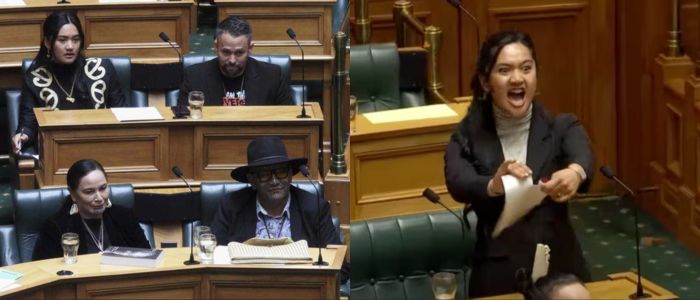Suspensions Without Precedent Lead to Debate
Parliament disciplined Hana-Rāwhiti Maipi-Clarke for seven days and party co-leaders Debbie Ngarewa-Packer and Rawiri Waititi for 21 days each. These are the longest suspensions of any New Zealand members, breaking a previous record of three days. (The haka is a traditional Māori chant and dance, and was led during a vote.) A parliamentary committee found that it was not the haka itself but the act of crossing the chamber floor toward rival lawmakers while doing it that was worthy of punishment. It was disruptive and could be seen as intimidating, committee chair Judith Collins said.
Maipi-Clarke, 22, the youngest member of parliament, rejected that and said others had done similar without facing those consequences. She said they suspected the cruel treatment was because they were Māori. “Is that the actual intimidation here? Do we speak too loudly for this house?” she had questioned in Parliament.
Cultural Expression and Parliament Protocol
The haka is a staple of New Zealand’s cultural consciousness and is commonly performed in celebrations and official events. It has even been played in Parliament to commemorate historic laws. But the protest haka led to a temporary suspension of parliamentary business, as MPs were in the midst of a count of a vote. Maipi-Clarke later apologise privately to the Speaker over the outburst. Some lawmakers pushed for rule changes to acknowledge Māori cultural forms of protest in Parliament, citing past evolutions, like allowing breastfeeding in the chamber, as precedents for updating the rules.
Mixed Opinions and Political Strains
The choice to enact the suspensions “demonstrated severe political splits,” according to a May analysis. The parliamentary disciplinary committee was divided, but a majority of the ruling government members voted in favour of it. One party aligned with the government went as far as to ask if the lawmakers could possibly be sent to jail, while many opposition members pushed for clemency, advocating for just a one-day suspension for Maipi-Clarke.
Speaker Gerry Brownlee earlier called for "all parties" to agree, but protracted debate concluded without a majority. Late on Thursday, after hours of passionate debate, the final vote was a clean one: All government members backed the suspensions, while all the opposition voted against them.
The Bill at the Heart of the Protest
The tattoo was a protest against a bill that aimed to change the constitutional principles of New Zealand’s Treaty of Waitangi, a historic pact signed by Māori chiefs with representatives of the British Crown. Critics said the bill would overrule decades of legal recognition of Indigenous rights and heralded a constitutional crisis. The bill eventually floundered amid massive public opposition, including mass marches to Parliament in November.
Although treaty-based recognition was instituted, indigenous Māori communities continue to experience major inequalities in health, social status, working conditions, and a range of other indicators, compared to the non-Māori population, which made the protest of the Māori party parliamentarians even more pressing.
World

New Zealand suspends Māori lawmakers for haka protest

New Zealand’s Parliament has handed out its longest-ever suspensions to three members of the Māori Party who performed a traditional haka in the debating chamber in a protest. The demonstration, which took place in November, was held to fight a bill that protesters argued would hurt indigenous communities. The decision has generated a debate over cultural expression, political protest and fairness in the legislative body.















